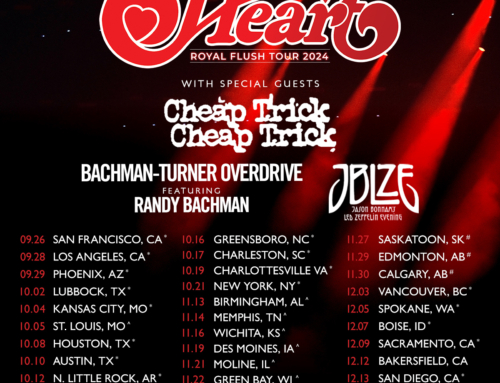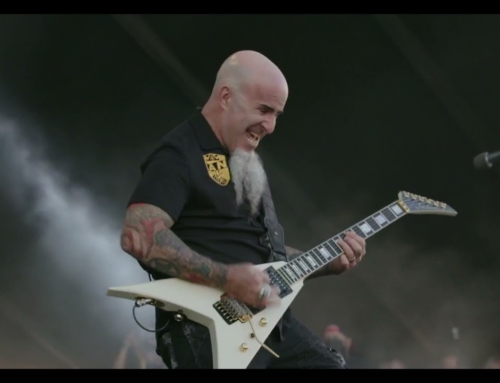Nugs.net, the leading music platform for live concert streams and recordings, has partnered with Round Hill Music for the global premiere of the feature documentary “Triumph: Rock & Roll Machine”.
Fans can tune in for the premiere event on Friday, May 13 at 8:30 p.m. EDT, which will kick off with an exclusive, moderated question-and-answer session with all three members of TRIUMPH — guitarist/vocalist Rik Emmett, drummer Gil Moore and bassist Mike Levine.
Tickets for the global streaming event can be purchased starting today for $19.95 exclusively at nugs.net/triumph. Streaming is available worldwide, with the exception of Canada. Tickets will be available through Sunday, May 15 at midnight EDT.
“We are thrilled to bring this exclusive streaming premiere to fans outside of Canada for the first time,” says Nugs.net co-founder Jon Michael Richter.
“As a consumer and marketer, I love what Nugs.net does and how many real music fans they regularly engage,” says Brian Hay from Round Hill Music.
“Triumph: Rock & Roll Machine”, produced by Emmy and Peabody award-winning Banger Films (ALICE COOPER, IRON MAIDEN, RUSH and ZZ TOP), delivers on revisiting a band that sold millions of albums, played for millions of fans, and never put themselves above their audience. The film covers TRIUMPH‘s humble beginnings as staples of the GTA circuit in the mid-’70s to their heyday as touring juggernauts, selling out arenas and stadiums all across North America with their legendary spectacular live shows — and way beyond.
Sam Dunn, who co-directed the film with Marc Ricciardelli, said: “The TRIUMPH story was compelling to me, Marc, and the Banger team because it was an opportunity to piece together a broken puzzle. We wanted to know how and why the band dissolved at the peak of their powers. It was quite the ride.”
Earlier this month, Moore spoke to “The Hook Rocks” podcast about “Triumph: Rock & Roll Machine”. Asked what it felt like seeing the documentary for the first time and having the band’s story told through someone else’s perspective, Gil said: “The film, I think, was so well shot and well directed and well scripted that it has a narrative where I’m looking at it almost looking in through the looking glass going, ‘Gee, that’s the story.’ And I was there, but I was too close to the story. And when I actually watch the film, it’s like being a passenger on the bus and not driving the bus. Very interesting seeing a career of a band defined in a film like that by someone else. And it’s almost like, yeah, I saw those puzzle pieces and they were all lying around on the kitchen table but I could never have imagined assembling those puzzle pieces and creating that picture. I don’t know if that’s a good metaphor or analogy, but that’s what it felt like to me, I would say, when I first saw it.”
Moore went on to stress the importance of letting the directors “have creative control” of the documentary. “I think if Mike or Rik or myself had tried to control it, the outcome wouldn’t have been nearly as good. And I joke now with Sam Dunn when I’m talking to him on calls and stuff, and if I ever start disagreeing with him on something, I’ll go, ‘Well, I’ve learned my lesson. I don’t disagree with Sam Dunn on anything ’cause he’s always right.’ [Laughs] [Because] that’s what he’s good at. He’s good at being a director. And Marc Ricciardelli, I’ve gotta say, Marc, he’s just an unbelievable editor. The way he can take the bits and pieces of film and stories and photos and chunks of animation and tell a story is just a phenomenal, phenomenal skill. Also, Don Allan contributed. He was one of the producers, but he was TRIUMPH‘s video director, and he contributed a lot creatively. Ralph Chapman, who wrote it — a great, great storyteller. And initially when we started, we had another writer, Peter Goddard from Toronto. And Peter‘s perspective on TRIUMPH has always been, I think, different and very perceptual into areas that I don’t think the three bandmembers really had a lens into.
“So there was a lot of people that contributed ideas — not as much as the two directors, of course, but there were a lot of other influences,” Gil clarified. “Mike, Rik and [I] had a little bit of influence — we had a little bit of input, little bit of say — but I think, really, if I was giving advice to another band and they said, ‘We’re gonna have a documentary,’ I’d say, ‘Well, tell the band to stay out of it. Just let the directors do their thing because you guys are way too close to the storyline. Let them find the good elements of the story that are worth telling and weave it together into the narrative that they can see.'”
Asked if it was difficult for him personally to let somebody else tell TRIUMPH‘s story, Gil said: “Yeah, totally. I’m a control freak — I would admit that — so I always have a tendency to wanna control things. And this was one where I just had to go, ‘Well, Gil, sit down and shut up. Put your seatbelt on and whatever happens, happens.'”
Last September, Emmett told The Metal Voice about “Triumph: Rock & Roll Machine”: “First of all, Banger Films made it, and they’ve done this before — they’ve done it for IRON MAIDEN, they’ve done it for RUSH, they’ve done it for Alice Cooper and ZZ TOP. I mean, these guys, they’re experienced. But they’re telling their perspective of the story. They’ve done their research and then they decided, ‘Well, this is the angle we’re gonna take.’ So that’s the first lens you’re getting. The other thing is it’s not my story, because I was only a part of TRIUMPH. And, in fact, I don’t actually own that brand; Gil owns that brand. So you’re gonna get a little bit more of Gil‘s angle of it than Rik‘s. And that’s fine — I’m cool with that — but in truth and in fairness, I think people need to know that. That’s what you’re gonna see — you’re gonna see something that’s been passed through those filters.”
He continued: “So, is this okay? Have all three guys signed off on this? Yes. But you’re not getting my story… Truth is perspective. Truth is a point of view. And everybody understands that; it’s just everybody also has this sort of ego thing where they go, ‘Yeah, but my truth is better than his.’ ‘My truth is way more important than hers.’ And that gets back to that vanity thing again about how you have to let go. So the documentary, you’re talking about trying to find truth from an integration, and I’m saying compromise and collaboration, yes, you get a kind of an integration, but what I’m showing you here, that’s only two dimensions. There’s more to this than just what you see.”
In 2020, Emmett told The Metal Voice about the making of “Triumph: Rock & Roll Machine”: “There’s a surreal nature to it — you’re going back in your life, and they’re reminding you of things that you’d completely forgotten,” he continued. “And you’re going, ‘Oh, yeah.’ And then they’re digging deeper, and they’re going, ‘So, when the band broke up…’ And you’re going, ‘Okay, this hurts, actually.’ I don’t wanna have to go back to that, because the rise and the fall and the rise again, it’s the fall that hurts. I don’t wanna go there. I thought I’d put all this behind me. It was ugly, heavy baggage.”
Emmett also talked about a “really extraordinary thing” Banger Films did while working on “Triumph: Rock & Roll Machine”. “They flew in fans from all over the world,” he said. “They created an event. And the fans didn’t know that we were gonna actually play three songs. So, they brought ’em all to the warehouse, and they’re wandering, and they’re looking at this TRIUMPH museum-y kind of thing. They’ve got dummies with my old spandex jumpsuits on. And then they send them down and they were gonna show them a few little clips on a scrim. The scrim drops and there we are and we play. And these are the people that love us the most. And there was only a couple of hundred of ’em. But it was so intense; it was so amazing. And, of course, they’ve got, like, 15 cameras around the room capturing every angle of this. And then you go, ‘Oh my God. This is heavy duty.’
“So it’s really good,” Rik added. “It really gets to the heart of, you’re a band, you create some music, you make a connection to people, and then here’s these people, you’re the soundtrack to their lives, and it matters to them. So they love you. I could get up there and fart, and they would go, ‘Yeah! Great!'”
The aforementioned invite-only event was held in November 2019 in front of 300 “superfans” at MetalWorks studio in Mississauga (a suburb of Toronto), Ontario, Canada. Emmett, bassist/keyboardist Mike Levine and Moore played a three-song set that marked TRIUMPH‘s first performance in 11 years, as well as its first as a pure three-piece power trio in 31 years. The tracks played were “When The Lights Go Down”, “Lay It On The Line” and “Magic Power”.
Moore, Levine, and Emmett formed TRIUMPH in 1975, and their blend of heavy riff-rockers with progressive odysseys, peppered with thoughtful, inspiring lyrics and virtuosic guitar playing quickly made them a household name in Canada. Anthems like “Lay It On The Line”, “Magic Power” and “Fight The Good Fight” broke them in the USA, and they amassed a legion of fiercely passionate fans. But, as a band that suddenly split at the zenith of their popularity, TRIUMPH missed out on an opportunity to say thank you to those loyal and devoted fans, a base that is still active today, three decades later.
Back in 2016, Moore and Levine reunited with Rik as special guests on the “RES 9” album from Emmett‘s band RESOLUTION9.
After 20 years apart, Emmett, Levine and Moore played at the 2008 editions of the Sweden Rock Festival and Rocklahoma. A DVD of the historic Sweden performance was made available four years later.








